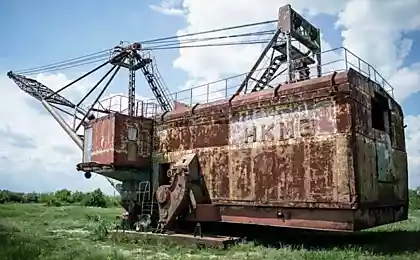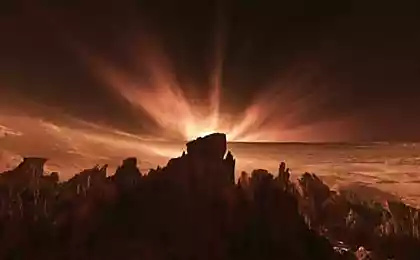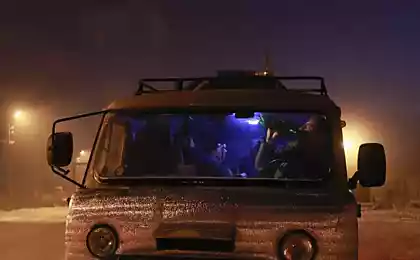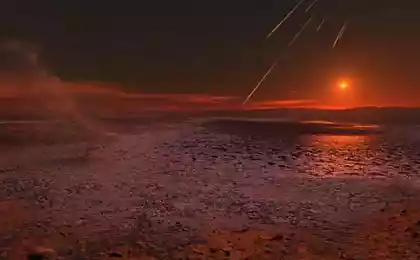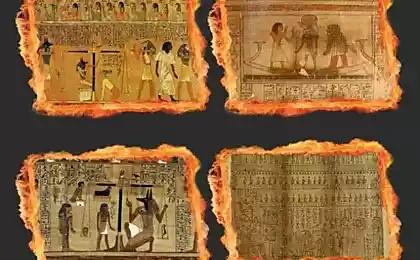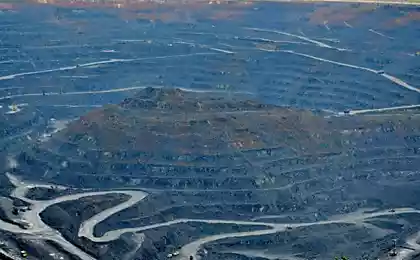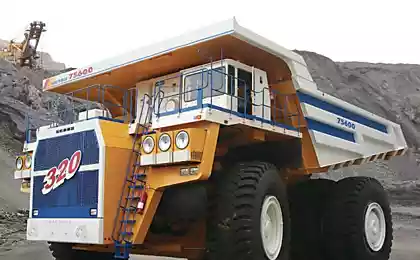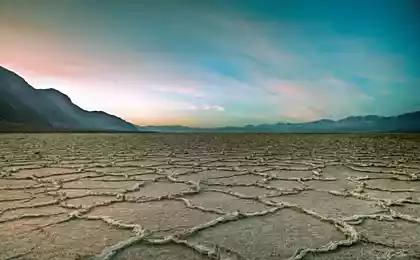1256
Valley of the Dead excavators.
Morozov quarry - one of the largest coal mines in Ukraine. Even some 5 years ago, work was in full swing here. Hourly huge draglines were shipping hundreds of KAMAZ coal. Now they are slowly rusting and waiting to be allowed to scrap. Soviet technique, 70s, and German, even before the war. This post - on orphan iron monster.
34 pictures
click
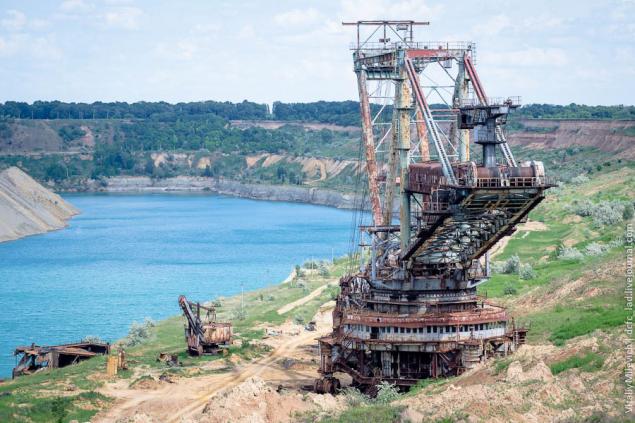
Morozov cut - one of the few places in Ukraine, where the mined lignite. The company barely survived the 90's and until recently worked. In 2009 the company turned off the electricity - for debt. Technique was the staff cut, pit quickly filled by groundwater. Cut waiting reclamation - says it wants to develop Chinese.
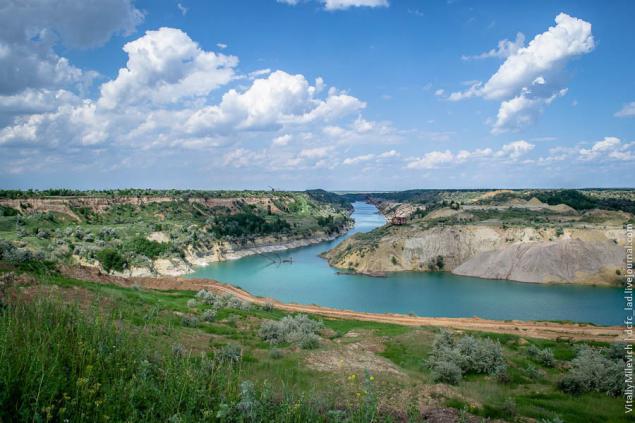
Recently Morozovskiy quarry is very popular among Ukrainian fans of industrial music. However, with each passing month, "exhibits" is becoming less and get more and more difficult for them. Quarry is well guarded. Top - two posts. The guards - great guys, used to work here Excavator. My question is whether you can come down, frightened answer: "That you sho, in the same Donetsk metal cut!". A closer look - the same cut. Loaded KAMAZ scurry back and forth literally every five minutes. This - only came to loading. To take away is that.
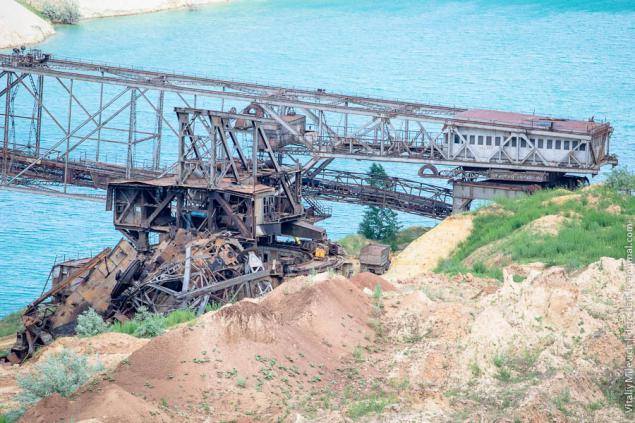
The men firmly believe that soon they will make excavators and revive production. As gritstsa - Blessed are those who believe.
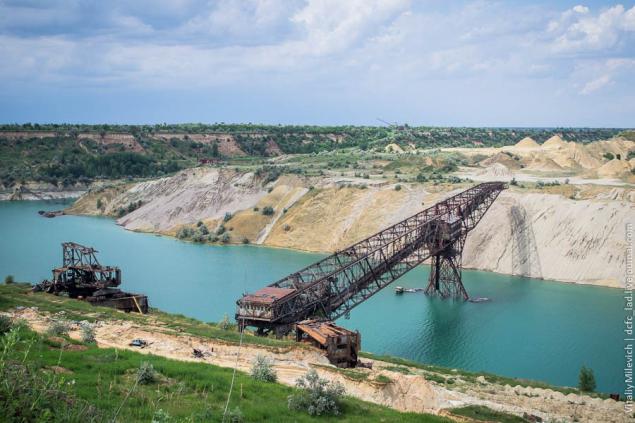
According to estimates, deposits of coal here will be enough for 20 years of active production.
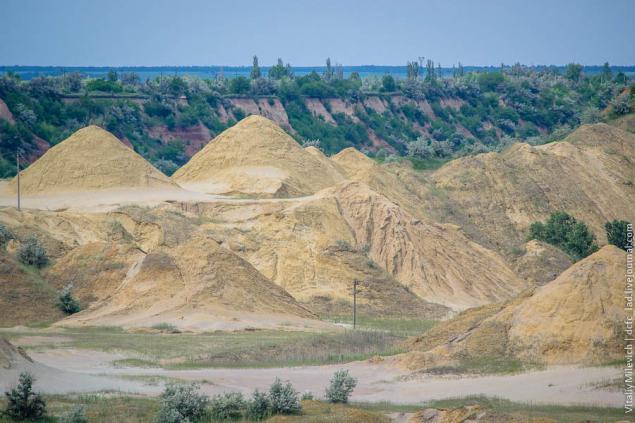
The main attraction of a career - a huge bucket-wheel excavator. Bottom left is normal - you can compare sizes.
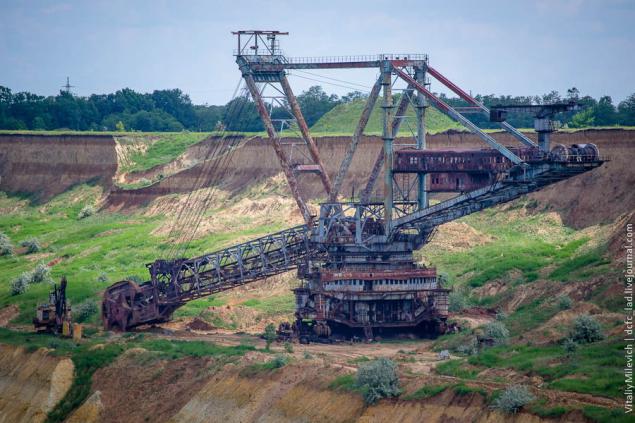
My name is monster ERSHR-1600. Labelled everything is simple: shovel rotary stepping-rail performance 1600 cubic meters per hour. To make it clear - it is about 200 KAMAZ vehicles. I repeat - in an hour!
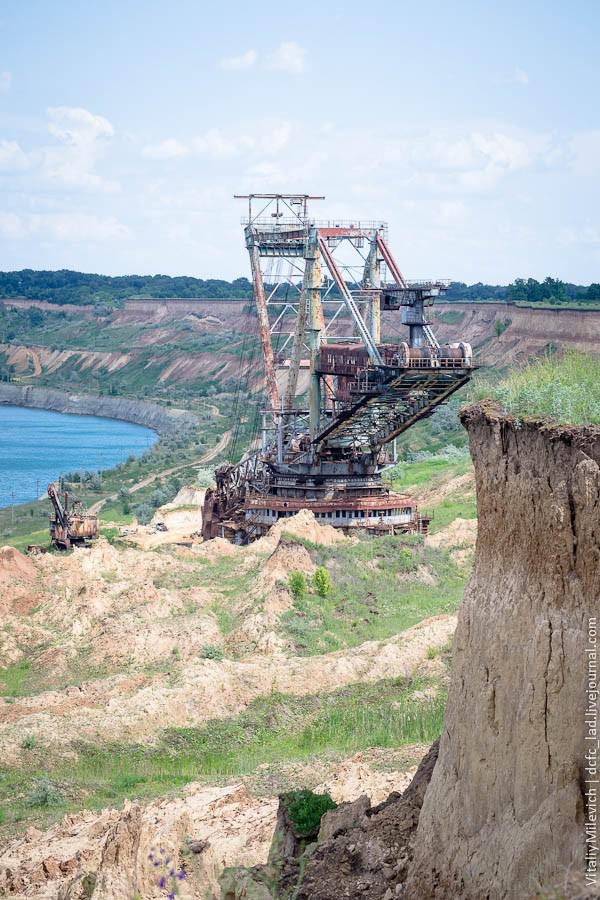
Machine built in 1970. Parts were brought individually for several years and then, on the spot, the workers collected the monster.
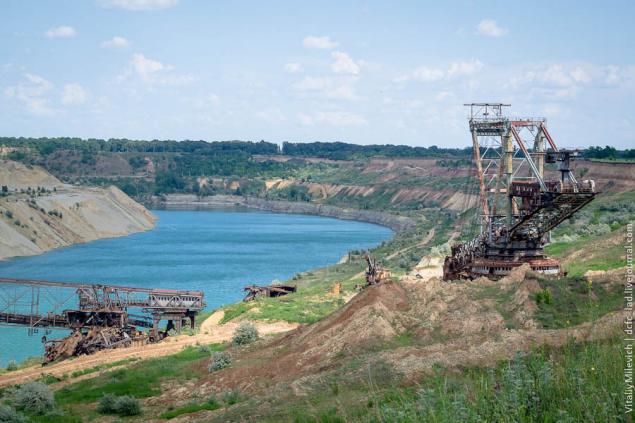
Weighing machine of 4000 tons. No, I have not sealed - four thousand. It's like 80 railway carriages. The girth really my almost-five-story building Khrushchev.
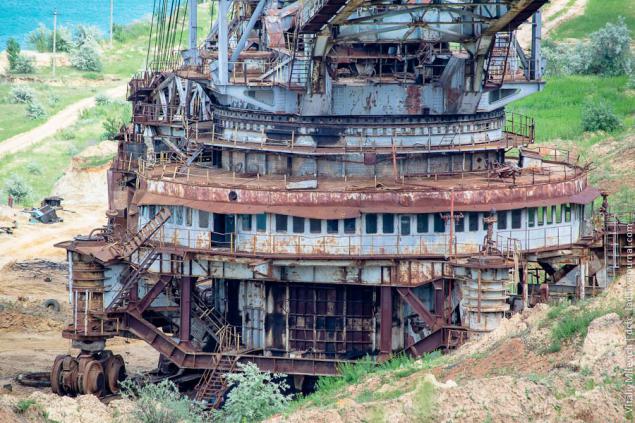
He moved at a speed of two meters per minute. Slowly but surely)
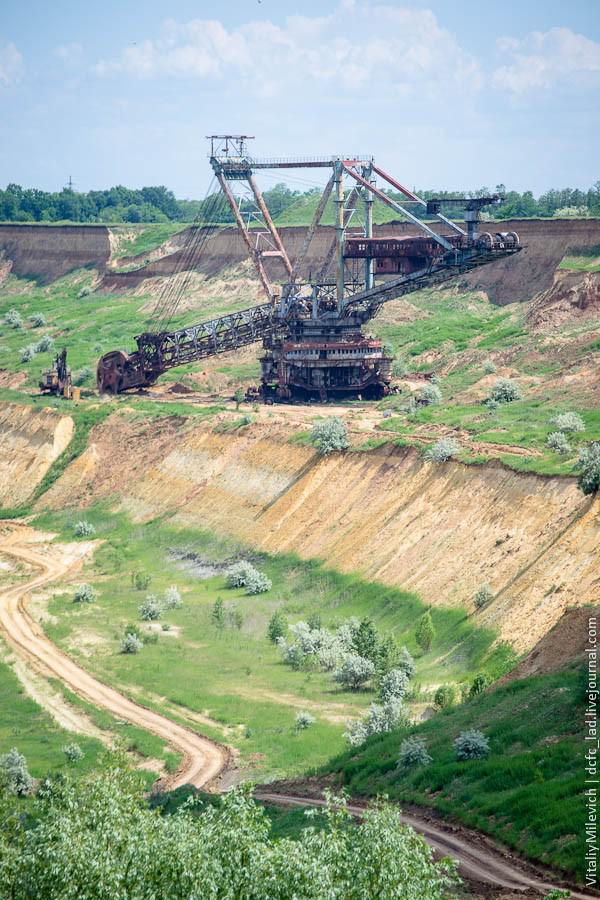
This excavator quarry. He walked along the edge, cut off the top layer, and then proceeded to the dragline mining of coal, and he went down to the level below and dig there.
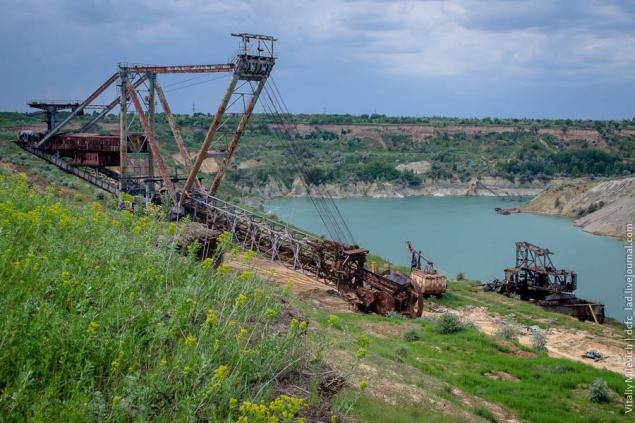
The huge wheel on the end of the boom - the actual rotor. Diameter - 16 meters. To it was attached 10 buckets. Recently, they were cut for scrap.
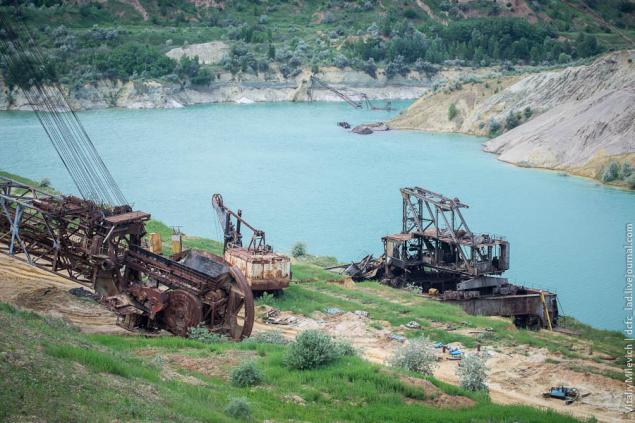
13.
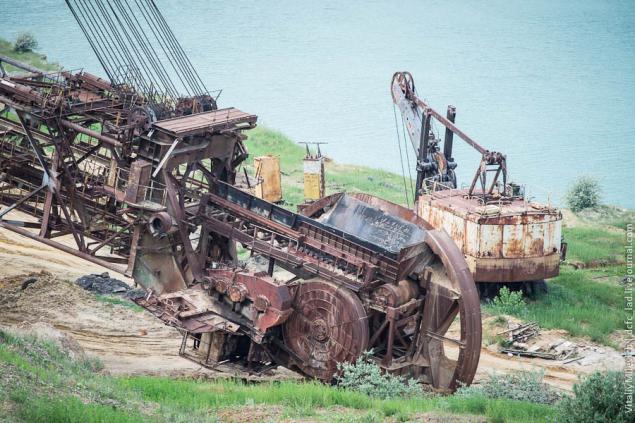
Dragline. He - walking excavator ESH-6/45. Labelled - again nothing fancy. The letters just an abbreviation. The figures indicate bucket capacity (in cubic meters) and length of the arrows, respectively.
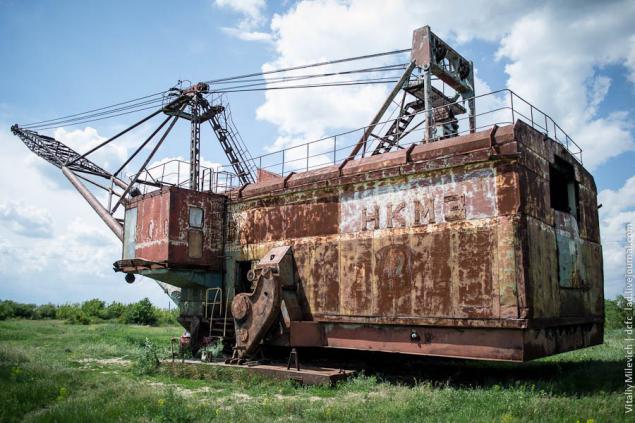
NKMZ - Novokramatorsky Machine Works. Among rust still emerges the profile of Lenin.
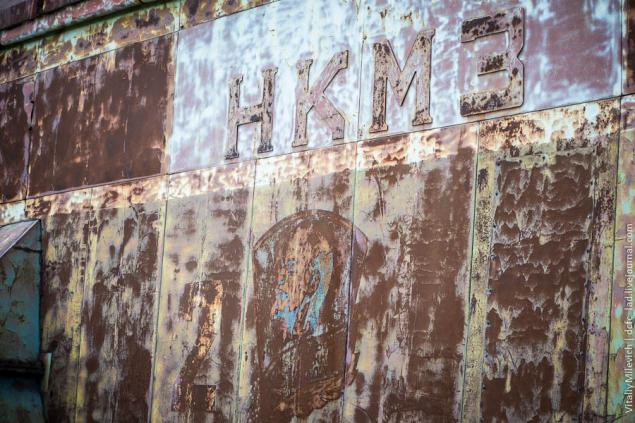
Such excavators produced since the early 70's to late 80's. Total draglines this class NCMH riveted more than 300 pieces. They are available in all the countries of the socialist camp.
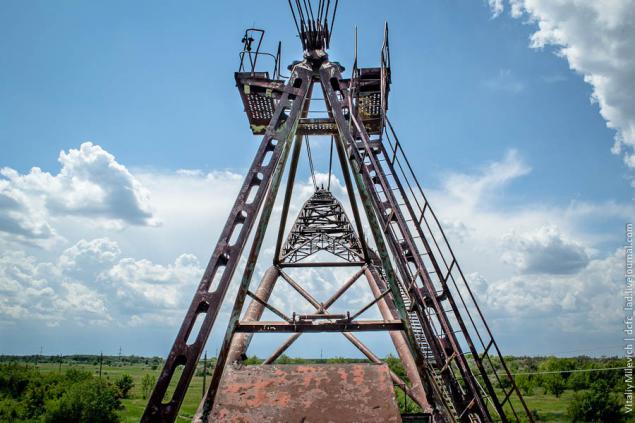
17.
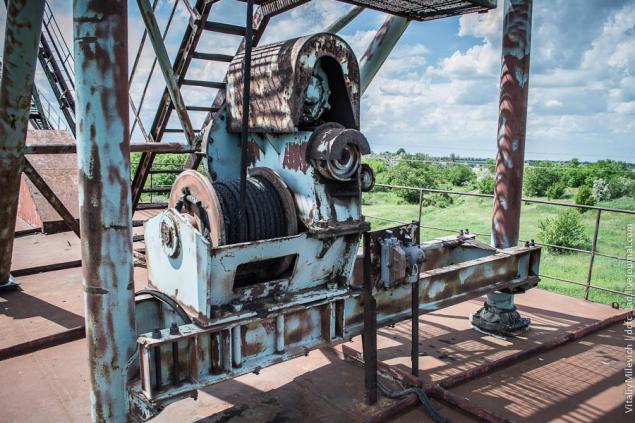
18.
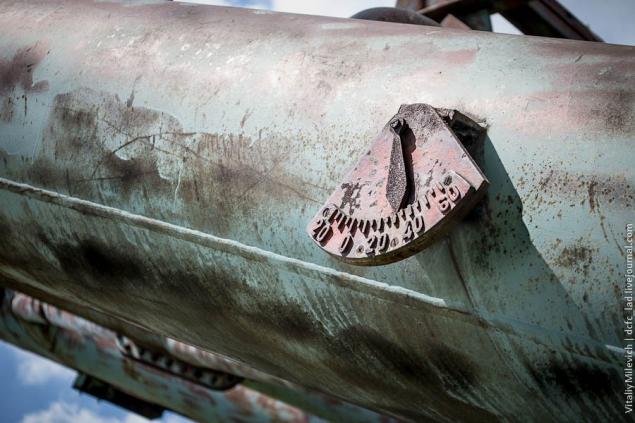
Paws) That they have it "walks».
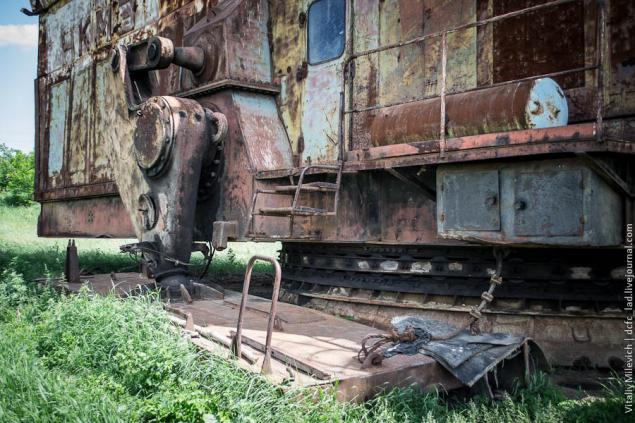
This - the only excavator in which even managed to climb and climb inside.
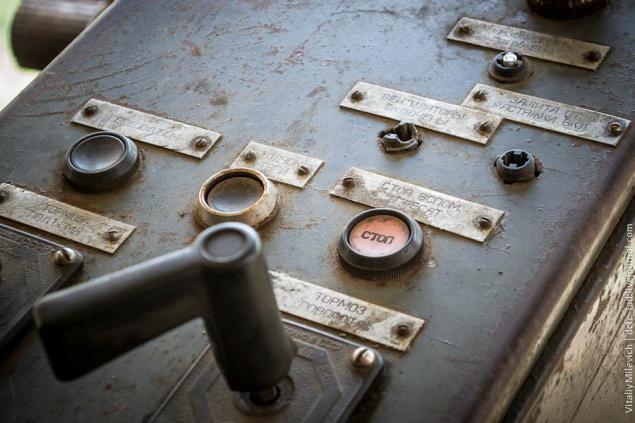
21.
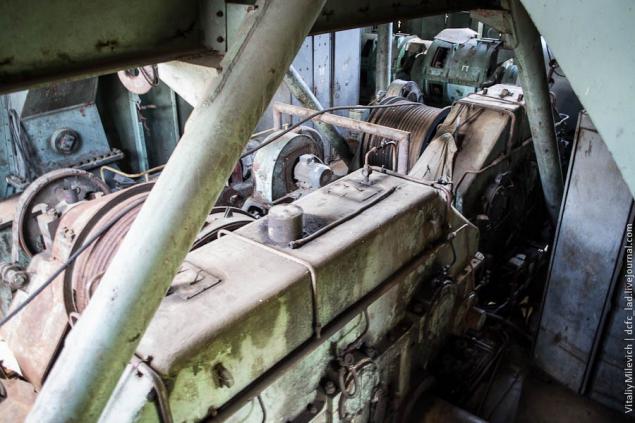
Few details.
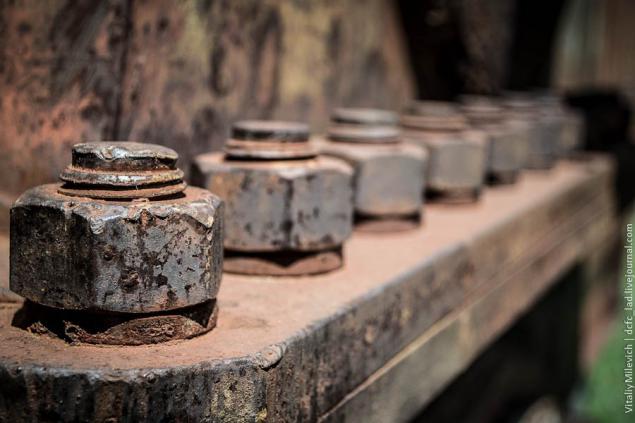
23.
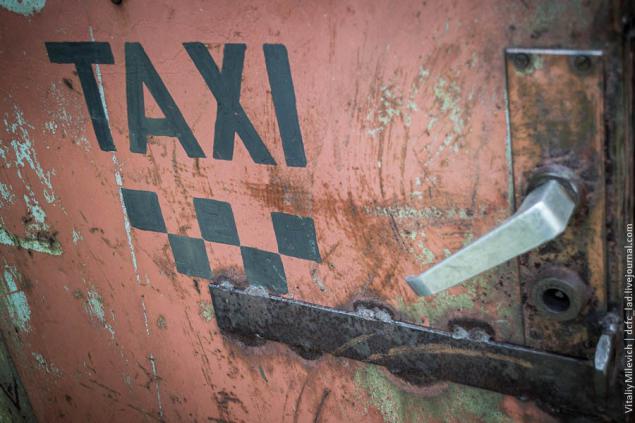
And this is - his older brother. It is one and a half times more. Boom length - 70 meters. For comparison - this is the standard width of a football field.
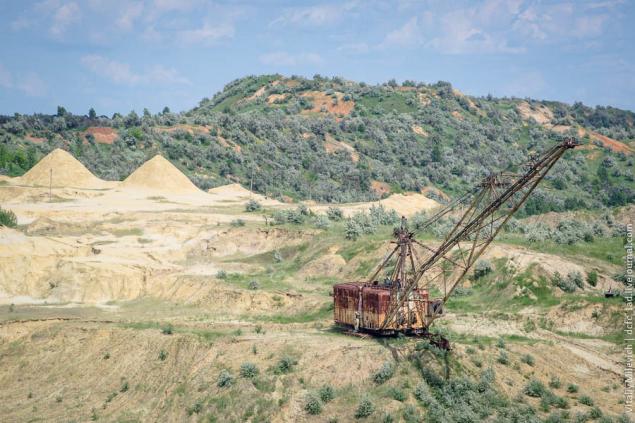
Just incredible colors. I've never seen such a combination in nature.
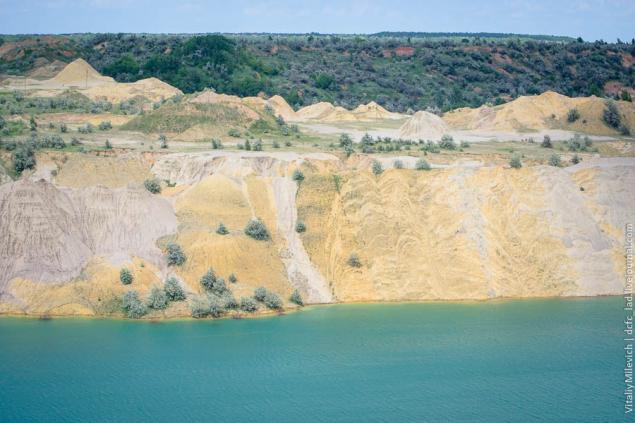
26.
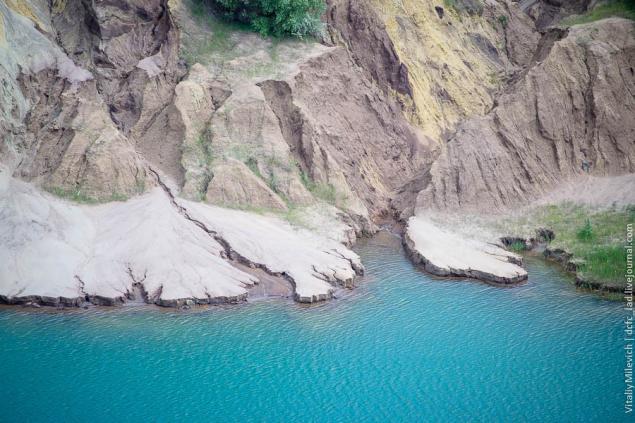
Water every year more and more. Locals say - depth "tall with three pillars».
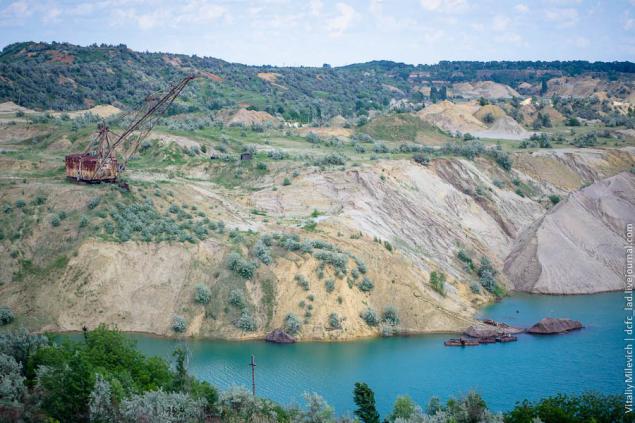
They say every day the water level rises by 1 cm.
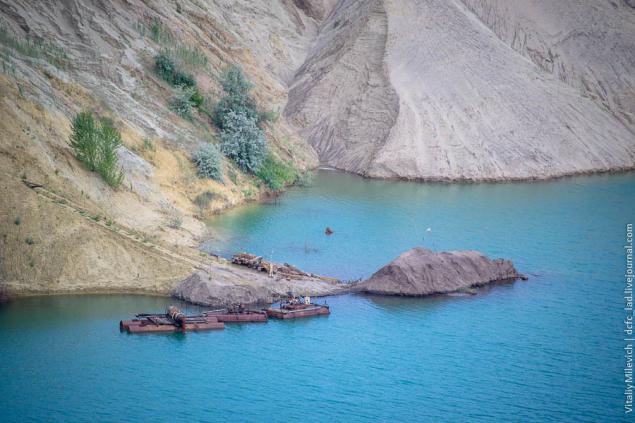
Under water - power line, pipeline, and much more. Almost drowned and one of draglines. In the photo they seem small. In fact, the excavator boom right 70 meters, the bucket - 10 cubes. From a distance they look like skeletons of some dinosaurs. Or giraffes.
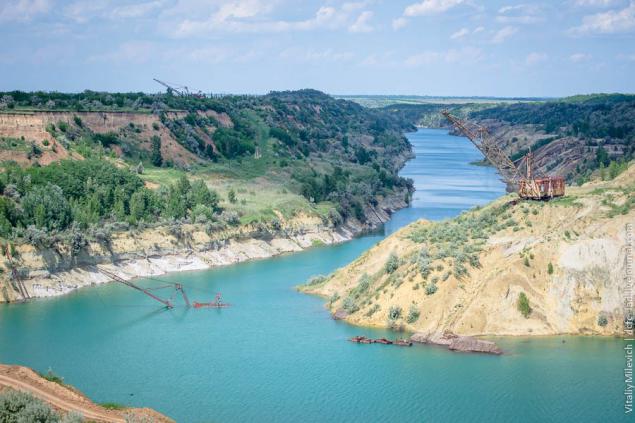
Left on the hill - our old friend, which we climbed.
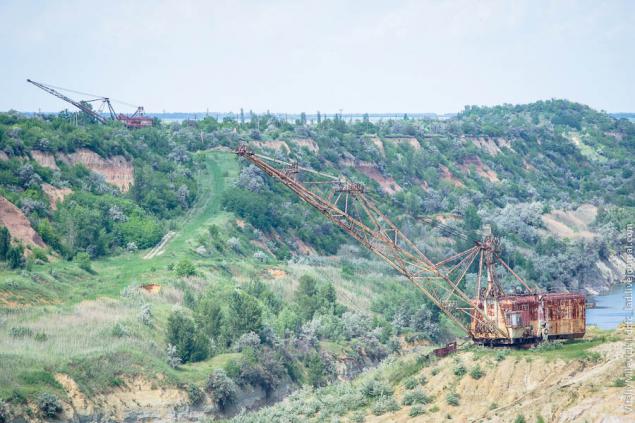
Conveyor Bridge - the only one in Ukraine. Trophy. The bridge was brought from Germany after World War II. There it was used in 1929 at the coal mine in the town of Bregvitts.
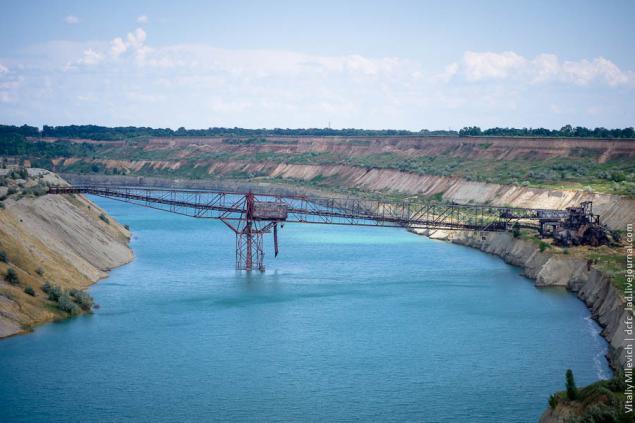
32.
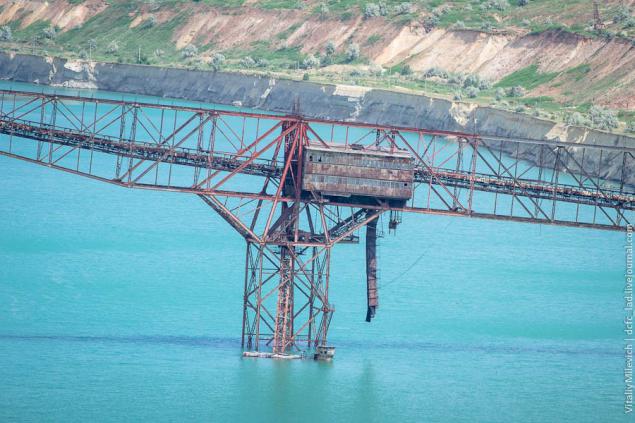
Also this bridge called the Conveyor. I do not know the difference. It seems like he is self-propelled.
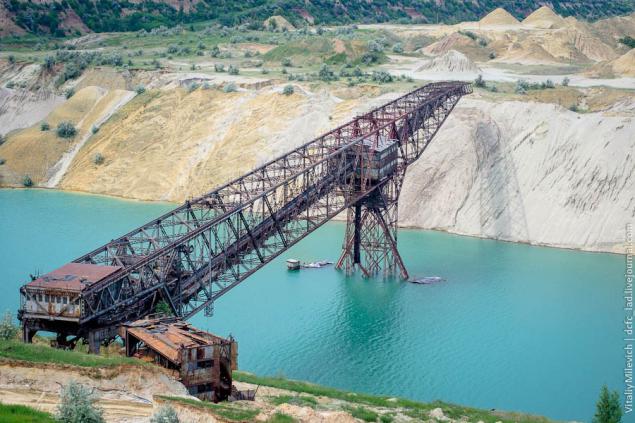
Once in a career there are two kind of old German excavator. But then I came to them, whether they have already managed to cut the metal. You and I do not live in Germany, so the museum of iron monsters do, no one will. So if you want to see them live - hurry.
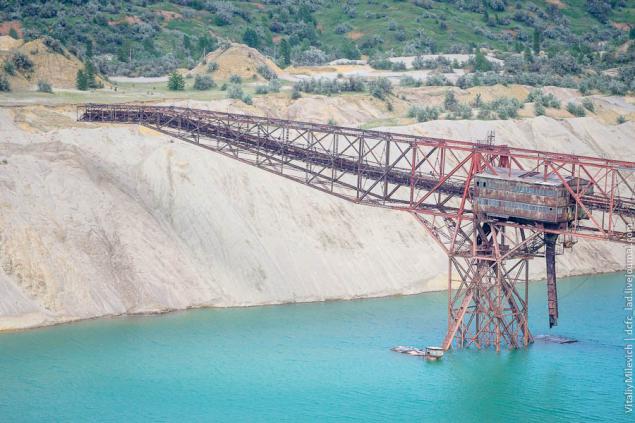
Source:
34 pictures
click

Morozov cut - one of the few places in Ukraine, where the mined lignite. The company barely survived the 90's and until recently worked. In 2009 the company turned off the electricity - for debt. Technique was the staff cut, pit quickly filled by groundwater. Cut waiting reclamation - says it wants to develop Chinese.

Recently Morozovskiy quarry is very popular among Ukrainian fans of industrial music. However, with each passing month, "exhibits" is becoming less and get more and more difficult for them. Quarry is well guarded. Top - two posts. The guards - great guys, used to work here Excavator. My question is whether you can come down, frightened answer: "That you sho, in the same Donetsk metal cut!". A closer look - the same cut. Loaded KAMAZ scurry back and forth literally every five minutes. This - only came to loading. To take away is that.

The men firmly believe that soon they will make excavators and revive production. As gritstsa - Blessed are those who believe.

According to estimates, deposits of coal here will be enough for 20 years of active production.

The main attraction of a career - a huge bucket-wheel excavator. Bottom left is normal - you can compare sizes.

My name is monster ERSHR-1600. Labelled everything is simple: shovel rotary stepping-rail performance 1600 cubic meters per hour. To make it clear - it is about 200 KAMAZ vehicles. I repeat - in an hour!

Machine built in 1970. Parts were brought individually for several years and then, on the spot, the workers collected the monster.

Weighing machine of 4000 tons. No, I have not sealed - four thousand. It's like 80 railway carriages. The girth really my almost-five-story building Khrushchev.

He moved at a speed of two meters per minute. Slowly but surely)

This excavator quarry. He walked along the edge, cut off the top layer, and then proceeded to the dragline mining of coal, and he went down to the level below and dig there.

The huge wheel on the end of the boom - the actual rotor. Diameter - 16 meters. To it was attached 10 buckets. Recently, they were cut for scrap.

13.

Dragline. He - walking excavator ESH-6/45. Labelled - again nothing fancy. The letters just an abbreviation. The figures indicate bucket capacity (in cubic meters) and length of the arrows, respectively.

NKMZ - Novokramatorsky Machine Works. Among rust still emerges the profile of Lenin.

Such excavators produced since the early 70's to late 80's. Total draglines this class NCMH riveted more than 300 pieces. They are available in all the countries of the socialist camp.

17.

18.

Paws) That they have it "walks».

This - the only excavator in which even managed to climb and climb inside.

21.

Few details.

23.

And this is - his older brother. It is one and a half times more. Boom length - 70 meters. For comparison - this is the standard width of a football field.

Just incredible colors. I've never seen such a combination in nature.

26.

Water every year more and more. Locals say - depth "tall with three pillars».

They say every day the water level rises by 1 cm.

Under water - power line, pipeline, and much more. Almost drowned and one of draglines. In the photo they seem small. In fact, the excavator boom right 70 meters, the bucket - 10 cubes. From a distance they look like skeletons of some dinosaurs. Or giraffes.

Left on the hill - our old friend, which we climbed.

Conveyor Bridge - the only one in Ukraine. Trophy. The bridge was brought from Germany after World War II. There it was used in 1929 at the coal mine in the town of Bregvitts.

32.

Also this bridge called the Conveyor. I do not know the difference. It seems like he is self-propelled.

Once in a career there are two kind of old German excavator. But then I came to them, whether they have already managed to cut the metal. You and I do not live in Germany, so the museum of iron monsters do, no one will. So if you want to see them live - hurry.

Source:


